Clean and sober, Christina was ready to be a regular, everyday mom to her baby girl and 6-year-old boy.
She’d completed treatment at Project WARM, a residential program in Flagler County that allowed her to keep her infant daughter with her as she planted her feet on the path of recovery. State child welfare officials were willing to return her son. They had taken him into custody amid the family strife that also drove Christina to a domestic-violence shelter, en route to rehab.
Now only one thing stood in the way of a fresh start as a family of three: they had no where to go.
That changed when the first floor of Family Renew Community’s flood-ravaged Daytona Beach campus reopened in May. Christina and her daughter were the first to move in a renovated unit, and her son soon joined them.
“I sat on the couch and looked around like, ‘Oh my God, I have my own apartment and I have my kids.’ Those are things I’m grateful for,” Christina told a newspaper reporter for a story on Family Renew Community’s comeback from Hurricane Irma.
On the day News-Journal social services writer Suzanne Hirt interviewed Christina and Daytona Beach Program Manager Laurie Archer-Dugo in Christina’s apartment, another family moved into the last of the five newly reopened ground-floor units. Family Renew Community, which has 32 apartments for homeless families in its three locations, was back up to full strength for the first time since the Sept. 11, 2017, storm.
Family Renew Community offers these residents with much more than shelter. The program is designed to help mothers and fathers change the direction of their lives for good.
That support gives Christina hope, though she still has hurdles to overcome. She’s grieving for her mother, who died of a drug overdose just before her daughter was born. Addiction-fueled felonies on her record made it difficult to find employment at first. As the case manager for Christina and the residents of Family Renew Community’s Daytona Beach campus for single mothers experiencing homelessness with their children, Archer-Dugo offered encouragement and connected her with services to overcome the barriers.
“I feel like this has given me a chance to succeed,” Christina said.

